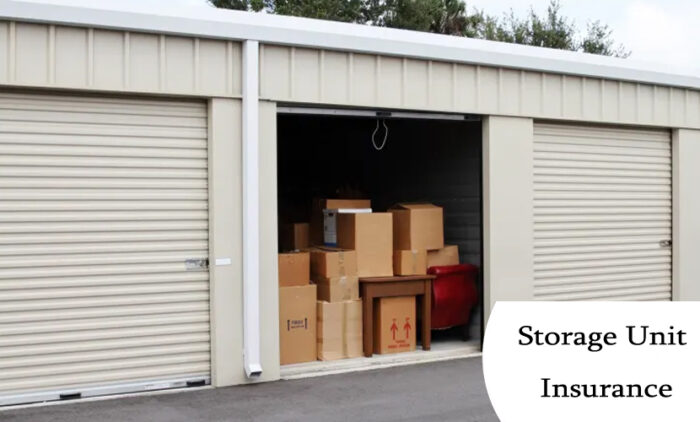Secure your valuable items in a storage unit with the financial protection offered by storage unit insurance.

This insurance coverage is essential as it provides a safety net against unforeseen circumstances such as theft, vandalism, and severe weather conditions.
While your existing insurance policies, such as business, renters, or homeowners insurance, might offer some coverage for your belongings, protection is often limited when it comes to items stored off-premises, which includes storage units.
Homeowners insurance, for instance, typically provides coverage for personal property located away from your residence.
But the coverage is usually capped at a certain percentage, often 10%, of your dwelling coverage amount.
This means that if your dwelling coverage amount is $200,000, your off-premises belongings will only be insured up to $20,000.
Consequently, if the value of your stored items exceeds this limit, you may be left financially vulnerable in the event of a loss.
Therefore, securing storage unit insurance is a prudent decision to ensure comprehensive coverage for your valuable possessions.
How Does It Work?
Many self-storage providers mandate that customers have insurance for their stored belongings. When inquiring about leasing a storage unit without sufficient insurance, the facility might propose their own policy or refer you to an affiliated third-party insurer.
However, it is advisable to carefully compare the terms and premiums of the storage facility’s policy with those of other insurance providers offering storage unit coverage and also assess the coverage provided by your existing home or renter’s insurance for offsite storage.
Certain storage unit insurance policies determine reimbursement based on the size of your unit in the event of a covered incident.
Typically, the reimbursement is limited to the actual cash value of the damaged items rather than their full replacement cost.
Like any insurance policy, the extent of your reimbursement is contingent upon whether the loss or damage is covered or excluded as per the terms of the policy.
What Covered By Storage Unit Insurance?
Your business, home, or renter’s insurance policy typically specifies the types of “perils” or problems that your policy covers.
Generally, damage or loss must be a consequence of a problem outlined in your policy to be eligible for reimbursement.
Standard issues covered by an existing policy, such as home insurance, typically include:
- Fire.
- Lightning.
- Wind.
- Smoke.
- Vandalism.
- Theft.
- Falling objects.
- Weight of snow or ice.
What Is Not Covered By Storage Unit Insurance?
Common exclusions may arise when items in a storage unit fall under an existing policy, such as home insurance, including:
- Water damage such as water backup.
- Earthquakes, tremors, sinkholes, and mudslides.
- Mold and mildew.
- Power failure.
- Neglect.
- Intentional loss.
- Insects and rodents.
- Poor maintenance and upkeep.
- Wear and tear.
However, it is essential to note that some of the exclusions mentioned above might be covered in a separate storage unit policy.
Similarly, certain exclusions may apply to a separate policy, such as excluding coverage for jewelry or furs.
Therefore, it is important to verify your certificate of insurance to understand what issues are not covered by your policy.
Where Can You Purchase Storage Unit Insurance?
Your Current Home, Renters, Or Business Insurance Company
These existing policies may offer coverage for items stored in a storage unit, but the coverage may be limited.
For instance, your off-premises belongings may only be insured up to a certain amount, such as 10% of your total personal property coverage under your homeowners insurance.
Specialized Vendors
These are companies that specialize in providing insurance coverage for storage units. They can offer more comprehensive coverage options tailored to the unique needs of storing items in a storage unit.
Third-Party Insurers
These are insurance companies that offer stand-alone policies. These policies can provide more extensive coverage than what is included in your off-premises coverage under your existing insurance policies.
By exploring these options, you can ensure that your stored belongings have the necessary coverage and protection, providing you with peace of mind.
Who Should Consider Storage Unit Insurance?
Unexpected events such as theft, arson, or accidental fires can result in significant financial losses at a storage rental facility.
If your storage unit is affected by such incidents, the potential loss of your stored belongings could be devastating.
To safeguard your valuables stored in a storage unit, it is essential to have adequate insurance coverage to protect against damage or loss.
Even with round-the-clock surveillance, the chances of recovering stolen items are often slim. By having a policy, you can mitigate some of the financial impact of such losses.
When considering insurance options from the storage rental facility, it is crucial to carefully review the policy terms.
Some storage facility insurance policies may have limitations that could leave you underinsured. Ensuring that you have sufficient coverage to protect the value of your stored items is vital.
Additionally, understanding which disasters are covered by the policy is important for making informed decisions about protecting your stored belongings.
How Much Is Storage Unit Insurance?
The cost of a policy varies based on the source of purchase and the extent of coverage you choose.
Generally, the premium for insurance will be influenced by the coverage limits and the number of named perils included in the policy.
Opting for higher coverage limits or broader coverage may result in a higher premium. In certain cases, it might be more cost-effective to buy a standalone insurance policy rather than increase the personal property coverage limit on your home or renter’s insurance policy.
Frequently Asked Questions
Is Insurance Mandatory For Unit Storage?
While unit storage insurance is not legally required, it is highly recommended to protect your belongings from potential risks such as theft, natural disasters, and other perils.
Storage facilities may also require tenants to have insurance coverage as a condition of rental.
Can I Use My Homeowners Or Renters Insurance Policy To Cover My Belongings In A Storage Unit?
Yes, your homeowners or renters insurance policy may provide coverage for your belongings in a storage unit, but the coverage may be limited.
It is essential to review your policy or contact your insurance provider to understand the coverage and any limitations.
What Happens If I Don’t Have Insurance For My Storage Unit?
If you don’t have insurance for your storage unit and your belongings are damaged or stolen, you may not be able to recover the costs of replacing your items.
It is recommended to have insurance coverage to protect your belongings in case of unforeseen events.
Can I Purchase Insurance For My Storage Unit Online?
Yes, many insurance providers offer the option to purchase storage insurance online. However, it is essential to compare different policies and providers to ensure you are getting the right coverage for your needs.



